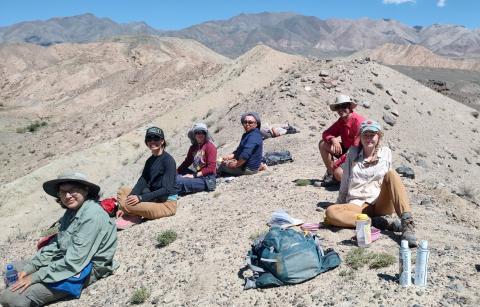
A Lehigh geology professor and two students spent a month this summer studying the Altai Mountains in western Mongolia and returned to Bethlehem profoundly changed.
How high – and massive – do mountains need to grow and how long does it take before their elevation impacts global climate patterns?
“The Altai impacts how the rest of the climate system circulates” well beyond central and east Asia, said Frank Pazzaglia, professor of geology in the Department of Earth and Environmental Sciences and leader of the Lehigh research team.
Charting the Altai’s birth, uplift and the rate at which the mountains grow will ultimately lead researchers to the climate impact question, he said.
A 10-member team with participants from Lehigh, Colorado State University, the University of California Irvine and Mongolia dug into this question in the arid Mongolian desert. The Altai, an ancient mountain range, is at the convergence point of four countries: China, Kazakhstan, Mongolia and Russia.
Pazzaglia said the U.S. and Mongolia were the only countries involved in funding, support and logistics of the field work.
Joining Pazzaglia were doctoral student Nora Vaughan of Pittsburgh and Aurora Bertoldo, an undergraduate senior from Belvidere, New Jersey.
They lived and worked in bone-dry arid desert conditions where summertime temperatures easily logged 90°F and nights dipped into the 60° mark, Pazzaglia said.
Vaughan saw the impact of flexible thinking played out in the field, which opened her to embrace a willingness to reconsider geologic problems in fresh new ways.
“Frank was willing to think about the geologic problem in a different context – and that helped me refresh what I am doing. It was cool to see him have that attitude in the field,” she said.
Transformational trip
It’s easy to take mountains, rivers or valleys for granted without considering their larger impact to the environments around – and beyond them.
The team lived and slept in tents. They cooked and shared meals; researched and studied the impact of the Altai with funding from the National Science Foundation.
Eating dinner, collecting data and realizing “epiphanies in real time” gave a window into one another’s thoughts and creative processes. Set against the backdrop of a foreign country – and its people – Vaughan said the experience shifted her work approach.
“Being in the landscape and witnessing it, and the people and culture that had grown up to fit into this larger landscape [was powerful.] I’m glad Mongolia is one of those places for me,” she said.
See the full story here: https://cas.lehigh.edu/articles/lehigh-geologists-explore-secrets-mongolias-altai-mountainss
